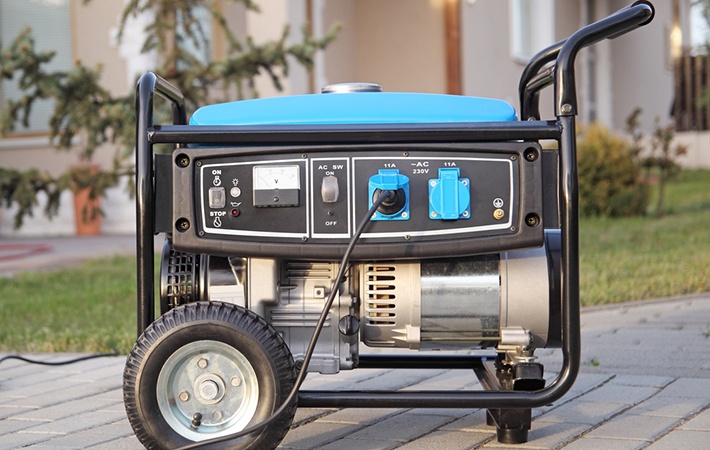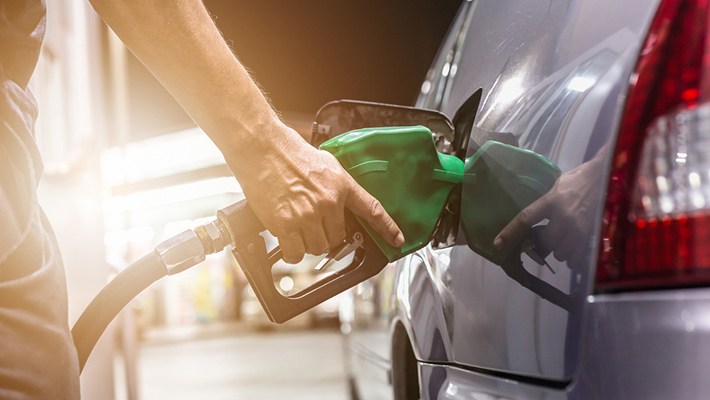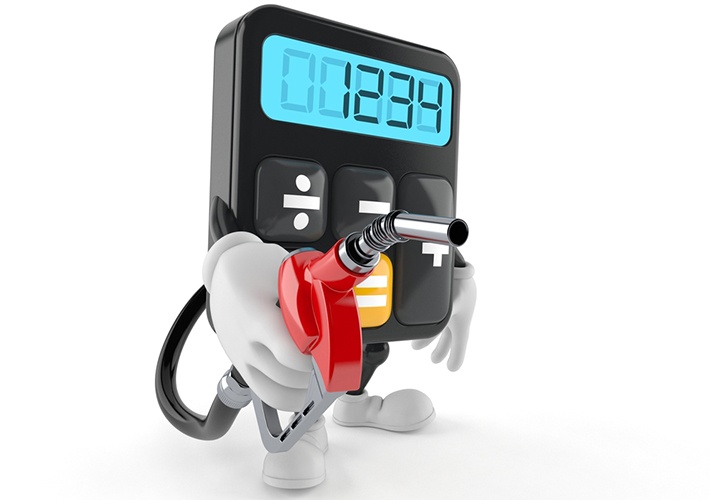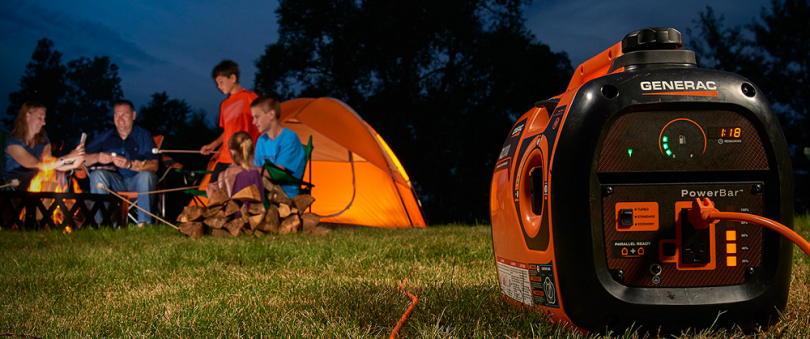You might think to yourself: isn’t taking a break from your phone and other electrical appliances the whole point of going camping?
It’s not that enjoying the simplicity of the great outdoors isn’t fun – it’s one of the best experiences ever, but sometimes you just need a power source.
In situations like this (or in case of a power outage), you’re going to need a generator.
To make sure you’re well prepared, you’ll have to determine how much gas does a generator use in a day first; stick around to find out how.
More...
First Thing You Need to Consider: What Type of Fuel Does Your Generator Use?
Before we move on to the actual fuel consumption, I’d like to take a moment to talk about the four most common types of generator fuel – propane, natural gas, gasoline, and diesel.
Each of these has some advantages and disadvantages that ultimately determine the efficiency of a generator.

Propane
This clean-burning fuel is one of the most popular when it comes to small, portable generators; on the other hand, it will rarely be utilized for commercial purposes.
That is because cost-wise, there are some significant issues with installing and storing it.
The Best Part? Propane-powered generators tend to produce a lot less noise than the other three types of generators.
Also, keep in mind that propane generators are among the most environmentally friendly.
Natural Gas
Generally speaking, natural gas is mostly suitable for in-town use because it requires a connection to the local utility grid; this is the only type of fuel on this list that is distributed through the town’s gas line, so no on-site manual fueling is needed.
Gasoline
That is one of the most common types of fuel used for generators and the easiest one to obtain since all it takes is a drive to the gas station (which is probably already on your list of errands). With this in mind, there are some issues to be considered.

Think about it: what do you like the most about camping? The part where you relax by the campfire. And what doesn't mix well with an open fire? That’s right, gasoline.
Consider: Due to its highly flammable nature, it might not be a good idea to have it lying around an open fire. Also, if you plan on going to the mountains, consider bringing a different fuel source, because gasoline is in no way suitable for cold weather.
Diesel
Even though diesel-powered generators tend to be more efficient than gasoline ones, chances are you won’t be using them in your household or on your camping trip, since they are mostly used for commercial purposes.
That’s because they’re capable of producing more than 150 kW of power, which is, hopefully, way more than you’ll need to power a few appliances.
Also, things are bound to get loud when you opt for a diesel generator; these things make a lot of noise when operating.
Discover More:
1. The Most Effective Coleman Fuel Substitutes
2. Keep Your RV In Top Shape With The Best Penetrating Oils: Your Toolkit In A Can
Calculating Fuel Consumption: A Simple Guide to Getting a Good Assessment
As I’ve mentioned previously, there are four main types of fuel used to power generators, and as if determining fuel consumption wasn’t complicated enough, to begin with, there are a lot more variables to take into consideration before making an assessment.
Later on in the article, I’ll talk about the costs of running a generator, but right now, it’s time to talk about calculating fuel consumption.

It all comes down to how many hours of runtime can you get out of your generator when it's powered by a gallon of fuel – this is your starting point in determining gas consumption.
Why is This So Important?
Because you certainly don’t want to spend half of your time refilling the generator.
Good news is that nowadays there are a lot of reliable fuel consumption calculators available online – these can help you get an estimated number easily.
However, don’t rely on them too much, or you’ll end up with too much or, even worse, too little fuel for your generator.
Before you turn to online calculators, read the product information provided by the manufacturer – these might be the most accurate numbers you can get when it comes to fuel consumption since manufacturers often have charts that include all the variables needed for a more precise estimation.
How Will a Generator Affect Your Budget?

Making estimations can be a difficult thing to do when there are various factors you need to consider before you can determine the costs of running a generator.
To make matters easier, I will divide this section of my article into four different categories based on the type of fuel used to power the generator.
Before we start, keep in mind that these estimations are based on a 24-hour running period; to determine the overall cost of having a generator run for more than a day, multiply the figures I provided with the number of days you’ll have it running.
- Propane – Propane tanks come in a variety of sizes, but if you own a portable generator, there’s no point in buying a non-portable 100-pound tank, right? For those purposes, a 20 or 40-pound tank will work better. Before you opt for a propane-powered generator, you should know that if it’s left running at full capacity, the generator will easily go through almost two full 20-pound tanks, with an overall cost of about $36.
- Natural Gas – Things are a bit more complicated when it comes to natural gas because you can't measure it in gallons (it’s measured in "therms") and it’s not common for portable generators to run on natural gas only. Consider the average price to be around $27 for an entire day - if your generator burns one therm per hour, that is.
- Gasoline – Considering the average price of gas in the United States, which is around $2.28 per gallon, and the size and efficiency of your generator, you can expect your 24-hour costs to be as low as $16 or as high as $34. Of course, these aren’t the exact numbers; it all depends on whether you’ll leave it working at maximum capacity or not.
- Diesel – This fuel type usually costs around 20 to 30 cents per gallon more than gasoline. As I mentioned earlier, diesel-powered generators are typically used for commercial and industrial purposes. However, there are some small, portable models available on the market, too. These tend to be relatively fuel efficient. When running at ½ capacity for 24 hours straight, it will cost you somewhere around 30 dollars.
Think You Can Manage Without a Generator? Well, Think Again

I can already imagine some of you camping enthusiasts out there shaking your heads at the mention of generators.
Camping should be about reconnecting with nature and leaving behind the world of electricity-powered devices for a couple of days, right?
While I would typically agree with you on this, there are some undeniable benefits of having a small generator at hand when you’re out in the woods for more than a day or two, and it’s time to mention a few of them:
- Keeping your phone charged for safety reasons
- Lighting up the campsite
- Enjoy some music
- No fear of getting a flat battery
- Cooling the tent with a portable camping fan
Final Words
With all that’s been said, I’m sure you’re well aware of the fact that there isn’t a way to know for sure – a lot of factors come into play when determining how much gas a generator uses.
It will depend on the type of fuel used, the unit’s efficiency and whether you’ll run it on ½ or full capacity.
To make sure you’ll have enough fuel, imagine the worst case scenario – a situation where you’ll need to have the generator running continuously for a 24-hour period on full capacity – and prepare accordingly.
